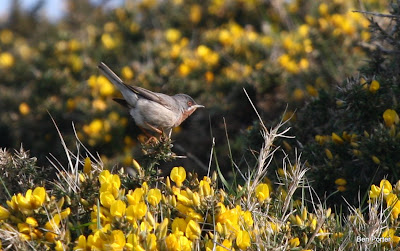I moved here five years ago with my parents
and sister to farm the island, and developed a very keen interest in birding
and photography. In 2013, I will be birding the island on my own up until
March, when Steve Stansfield (the warden of Bardsey Bird and Field Observatory)
returns with his family and assistant warden Mark Carter will also return. I
still have A-level school to work away at, and so will not see all of the
scarcities and rarities that turn up!
So, back to the species: Among
Bardsey's rarer visitros are the first Summer Tanager and Yellow Warbler to
have been seen in Britain and Ireland; other American visitors include American
Bittern, Sora, Killdeer, Spotted Sandpiper, Lesser Yellowlegs, Grey-cheeked
Thrush, Eyebrowed Thrush, American Robin, Song Sparrow, Dark-eyed Junco,
Rose-breasted Grosbeak, Blackpoll Warbler and White-throated Sparrows. From the
other direction have come River Warbler, Red-flanked Bluetail, Isebaline
Wheatear, Collared Flycatcher, Pine Bunting, Rock Bunting, Yellow-breasted Bunting,
Black-headed Buntings and Paddyfield Warbler.
Okay, a very nice list of rares, but
not many are likely to turn up in 2013. This year's species list stands at 184,
compared to 183 last year, representing the target for next year. This year saw
a brilliant run of scarcities in the spring, including Red-rumped Swallow,
Bee-eater, Black Kite, Red-breasted Flycatcher, two Greenish Warblers, Woodchat
Shrike, Melodious Warbler and Subalpine Warbler, whilst the autumn saw Wryneck,
Radde's Warbler, Citirine Wagtail and Little Bunting. Subalpine (both Western
and Eastern), Melodious and Icterine Warblers are somewhat of an island
speciality, and can almost be expected to turn up each year.
Seabirds are good, with Great
Shearwater, Sooty, Balearic and Manx, also Leach’s and Storm Petrel. Little
Egret, Spoonbill and Bittern are the best of the herons. Raptors are well
covered with Osprey, Hobby, Merlin, Goshawk, Honey, Common and Rough-legged Buzzard,
both Black and Red Kites, Marsh and Hen Harriers flying overhead.
Onto Skuas and Gulls…all four
species of Skua have been seen from the 'seawatching deck' in front of the Obs,
as have Sabine’s, Little and Med Gull, Glaucous and Iceland Gulls and Little,
Black and Caspian Terns among the commoner fair of this genus.
Little, Barn, Long-eared,
Short-eared and Snowy Owls have all been seen on the island, in fact all within
the boundary of Cristin.
The best of the rest near passerines
include Wryneck and Greater spotted Woodpecker, Hoopoe and Turtle Dove.
The island is excellent for
passerines: some are seen just flying over, like pipits, larks and this year's
Red-rumped Swallow. Some, thankfully stay: both Richard’s and
Blyth's Pipits have been seen within the bounds of the observatory and
Red-throated on the wall just across the road! All the common wagtails are seen
regularly.
There are only five records of Waxwings from the island, the latest
being a flock of 16 that graced the northern end of the island a week ago.
The island has an impressive warbler
list, including some crackers…like Paddyfield, Marsh,
Booted, Icterine and Melodious, Barred and Subalpine Warblers (ten!), Wood,
Greenish, Yellow-browed, Pallas’s, Radde’s and Bonelli’s!! Top this off with
Firecrest and it’s some list.
So there you have the species of
birds encountered on the island. The best sites of the island are Cristin (the
observatory-a small site covered in damson bushes); Nant (the most vegetated
area of the island to the North with a conifer plantation and three small
withies); The Withies (three small withy beds located in the centre of the
island often pulling out the goods); and The South End (at the southern end of
the island, often receiving large numbers of migrants attracted by Bardsey
Lighthouse, and also the first stop-off point for North-bound migrants).
The non-avian life is fantastic too,
with over 400 species of moth on the island list, plus cetaceans such as
Risso's Dolphins and the shore is peppered with almost 200 Grey Seals for most
of the year.








That looks like a cracking patch. Good luck with your A-Levels.
ReplyDelete